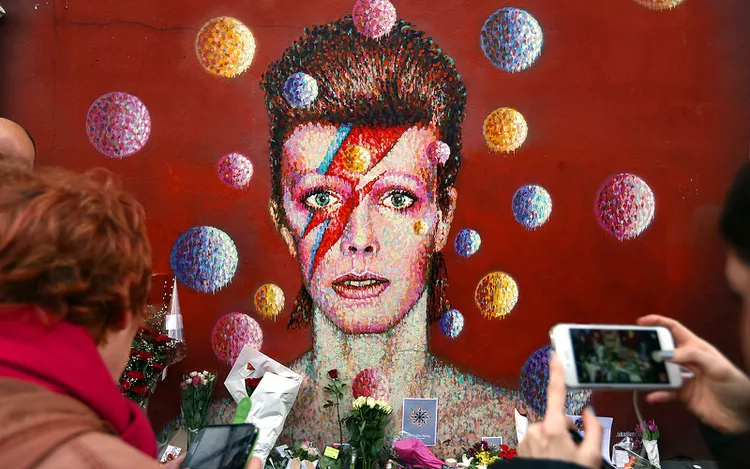David Bowie: A Journey Through His Iconic Locations in New York and London
During his lifetime, Bowie was a songwriter, rock star, actor, music producer, and celebrity—all while remaining a perpetual outsider. Just as it is impossible to pin Bowie down as one type of person, he cannot be tied down to just one city. In honor of what would have been his 70th birthday, we’re looking at two of the great cities Bowie called home. For all those who want to pay homage to the legend, these are the spots in New York and London where Bowie would shed his iconic persona and just blend into the city.
New York City: 285 Lafayette Street
:max_bytes(150000):strip_icc():format(webp)/lafayette-street-condo-soho-BOWIE0117-166a483a45b04eaa878c74be966e0f8b.jpg)
By the time of his death, Bowie had lived in New York for over 20 years. “I’ve lived in New York longer than I’ve lived anywhere else. It’s amazing. I am a New Yorker,” he said in an interview in 2003. As a New Yorker, Bowie was fond of early morning walks and weekly haunts. Here are a few of the places he would go.
Bowie’s Soho condo became a gathering place for mourning fans last year. Bowie and Iman moved into the building in 1999 and he admitted to being quite a homebody in his later years, spending lots of time around the apartment.
McNally Jackson Books
:max_bytes(150000):strip_icc():format(webp)/mcnally-jackson-books-BOWIE0117-c1993debc7064e53b111fc55cba46901.jpg)
His lyrics were often strewn with literary references. Pay homage at one of his favorite New York bookstores, McNally Jackson Books. Bowie used to wander into the bookshop so much that the store tweeted, “We were lucky enough to occasionally get to sell books to David Bowie, who, in addition to being, you know, Bowie, was also a great reader.” Immediately after his death, the bookstore changed their window display to Bowie’s 100 favorite books.
Bleecker Street Records
:max_bytes(150000):strip_icc():format(webp)/bleecker-street-records-BOWIE0117-eaa92e50d83d40aa9b834dadda84692a.jpg)
Bowie enjoyed shopping for records around the city—although his favorite spot, Bleecker Bob’s, closed in 2013. However, this record shop in Greenwich Village was a spot Bowie would often pass on his early morning strolls.
Washington Square Park
:max_bytes(150000):strip_icc():format(webp)/washington-square-park-BOWIE0117-9169ab2a034a4635aece437882f7e566.jpg)
Bowie once said that Washington Square Park was his favorite place in the entire city. He would often pass through on his walks to look at the odd assortment of characters who would inevitably gather in the park.
New York Theater Workshop
:max_bytes(150000):strip_icc():format(webp)/new-york-theatre-workshop-BOWIE0117-57ee8359215945c38c2eed7d4fb45fd7.jpg)
One of Bowie’s last projects was co-writing Lazarus, a musical sequel to The Man Who Fell to Earth. Although the show closed a few days after his death, he spent time in the theater collaborating and getting his songs just right. Visitors who wish to pay homage to Bowie’s contributions to theater can also visit the Booth Theater, where Bowie played in The Elephant Man in 1980.
Dean & Deluca
:max_bytes(150000):strip_icc():format(webp)/dean-and-deluca-soho-BOWIE0117-51f610faefde401ca93de5c0efcda4de.jpg)
In his later years, Bowie was nothing if not habitual. He was known to do his grocery shopping every week at Dean & Deluca in Soho. “Everybody always appreciated how nice he was, how he just seems like a regular guy,” store manager Marla Tremsky said.
London: 40 Stansfield Road, SW9
:max_bytes(150000):strip_icc():format(webp)/forty-stansfield-road-BOWIE0117-1bfa3843a27943af85964c64d0460b13.jpg)
Bowie was born in London and spent the early part of his career dodging around the city. In honor of his birthday, a two-hour walking tour around Bowie’s London will launch. Here are a few of the stops that were important to the formation of the Thin White Duke.
Bowie was born in Brixton and lived at this address until he was six years old. Although back then, he was known only as David Robert Jones.
Heddon St Alley, W1B
:max_bytes(150000):strip_icc():format(webp)/heddon-street-ziggy-stardust-BOWIE0117-ce3c8f56cbc94b2ba113822c50fffffc.jpg)
It’s in this alley that Bowie posed for the iconic Ziggy Stardust cover. Fans still duck into the alleyway to recreate their own versions. The street is easy to spot, thanks to a plaque from the city of London, informing all who pass that “Ziggy Stardust” was there.
Bowie Mural in Brixton
James Cochran’s Bowie mural, painted in Brixton, has become a pilgrimage for fans. Take a photo in front of the Aladdin Sane scene and maybe add some flowers to the ever-present tributes from fans.
Trident Studios / 17 St. Anne’s Court, Wardour Street
:max_bytes(150000):strip_icc():format(webp)/trident-studios-BOWIE0117-672f08b489f44b148a4be630e88ea9ee.jpg)
Trident Studios was where Bowie recorded many of his well-known albums, including Hunky Dory and Ziggy Stardust. In its day, the studio was also used by The Beatles, Queen, and Elton John. Although the studio shut down in 1984, you can still spot a print from The Man Who Fell to Earth inside the building.
Pollock’s Toy Museum
:max_bytes(150000):strip_icc():format(webp)/pollocks-toy-museum-BOWIE0117-b3e33e7d77734809b3e2c521a48a0d8f.jpg)
In 1967, Bowie moved into a flat at 39 Manchester Street. During this time, he discovered this whimsical toy shop. Apparently, Bowie would come home from the shop, toting Victorian prints and other curiosities which he would then hang on the walls of his flat.
The Ship / 116 Wardour St
:max_bytes(150000):strip_icc():format(webp)/the-ship-pub-BOWIE0117-7684069709e04883baa855c97c3c809f.jpg)
Grab a pint at The Ship. It’s an Edwardian pub where Bowie famously gave interviews to journalists. Apparently, the pub was popular for all sorts of musicians at the time, including John Lennon.




